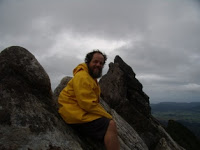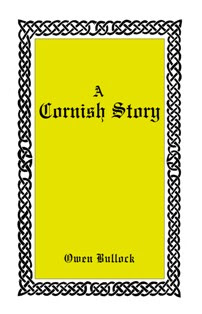Owen Bullock has published a work of non-fiction, Making Canons and Finding Flowers – A Study of Selected New Zealand Poety Anthologies (VDM, Germany, 2008); a book of haiku, wild camomile (Post Pressed, Australia, 2009); the novella A Cornish Story (Palores, UK, 2010), and a number of chapbooks of poetry. His first full collection of longer poems, sometimes the sky isn’t big enough, has just appeared from Steele Roberts (New Zealand). He has
edited several poetry magazines, including Spin and Poetry NZ. He lives near the Karangahake Gorge in the North Island of Aotearoa/New Zealand.
Details of how to buy all Owen’s books are at the end of this interview. Owen’s poem choosing was my Tuesday Poem this week.
Later I’ll focus on your new poetry collection, sometimes the sky isn’t big enough, but first, I want to ask you about a couple of your other books. First of all, which poetry anthologies did you look at in your non-fiction book Making Canons and Finding Flowers – A Study of Selected New Zealand Poetry Anthologies (VDM, Germany, 2008), and if it isn’t an impertinent question, what did you conclude about these anthologies?
I looked at ten anthologies covering the 1940s to 1980s, over four chapters. Firstly, I wrote about the Curnow anthologies of 1945 and 1960. Next came the three editions of the anthology Vincent O’Sullivan edited for Oxford between 1970 and 1987 (which I called ‘Confirming the Canon’).
Chapter three discussed Recent Poetry in New Zealand, edited by Charles Doyle (1965), The Young New Zealand Poets, ed Arthur Baysting, (1973), 15 Contemporary New Zealand Poets, ed Alistair Paterson (1980) and The Oxford Book of Contemporary New Zealand Poetry, ed Fleur Adcock (1982).
Chapter four, titled ‘Some Alternatives’, looked at Private Gardens – An Anthology of New Zealand Women Poets, ed Riemke Ensing, (1977), Big Smoke – New Zealand Poems 1960-1975, ed Alan Brunton, Murray Edmond and Michelle Leggott (2000) and Real Fire – New Zealand Poetry of the 1960s and 1970s, ed Bernard Gadd (2001).
I originally intended to write about 17 anthologies (I discovered 50 at the time – there are more now), but this was a Masters Thesis and I felt restrained by the word count.
I very much wanted to read each anthology as a book and discuss them in those terms. I wanted to chart developments and preoccupations of poets; I didn’t want to wade in with a theory and try to prove it.
Academics tend to talk about various privileges which ‘inform’ the selections of editors and other such things. But I concluded that a very strong privilege was that of association, between groups of writers, University presses and employees. Part of this is natural and I think I’ve got a firmer grasp of that now than I did them. I’ve tried hard in my editing work to avoid cliques and naively thought that was what everyone else was trying to do as well, but that’s not the case.
Complaints about anthologies are virtually obligatory and I firmly believe we learn nothing from history, interesting though it may be. There is always an establishment (even if it’s a young one which has just displaced another) and some people who are worthy will miss out, such as women writers like Elizabeth Smither, Jan Kemp, Peggy Dunstan, Christina Beer and Anne Donovan omitted from the 1976 edition of the Oxford anthology.
My drive for independence has meant risking losing certain writing friends at times. I may have been harder on my friends when they have submitted poetry to me for a magazine than on others, which is tricky, because I’m not so independent that I don’t need friends. I do wish poets could be more thick-skinned about their writing and realise, as Kai Jensen told me early on, that we have the potential to be part of a literary tradition. Whether or not someone accepts individual poems of ours isn’t very important in the overall scheme of things; poetry is what is important, not our poems.
You are of Cornish descent, and your novella A Cornish Story (Palores, UK, 2010) has recently been published. How has it been received in Cornwall?
It was well received. I did several book signings and readings on local radio and in St Ives during the Gorseth (a Cornish cultural festival, modelled on the Welsh Eisteddfod). Palores has good distribution through Cornwall, but my publisher, Les Merton, said that whilst I was out and about it wouldn’t hurt to offer the book to smaller bookshops and even village shops. So, I became a bit of a salesman for three weeks and sold quite a few copies, especially in West Cornwall.
It was gratifying when I read in St Ives to find that many fellow-writers had already read the book and were able to comment on my use of dialect. I felt very accepted by the writing fraternity there; they didn’t seem at all bothered that I have lived in New Zealand so long. I also had a glowing review in The Cornish Banner which described the book as ‘a masterpiece of Cornu-English’ and went on to suggest that it should be studied in Cornish schools.
During the book signings a few people re-appeared from my past, including my Primary School headmaster. Others came to say hello who knew someone else in my family – I couldn’t have been happier.
As an immigrant to New Zealand myself, albeit without a great deal of influence over the process as I was two years old at the time, I’m always interested to know: what led you to emigrate to New Zealand, and how do you feel about that decision now?
My ex-wife is a kiwi and we always intended to come here at some stage. We lived in Wales for a couple of years before that. It was a big adjustment for me initially, but I don’t regret it.
You’ve become well known as a poet since you emigrated to New Zealand, but also well known as an editor. What do you like about editing? Do you feel that it detracts from, or helps with, your own writing?
I enjoy the interaction with other poets and also seeing what is possible through poetry. Often you read a poem that isn’t entirely successful but which points in a certain new direction. I think it helps one’s writing as long as the editing task is not so lengthy that you don’t get enough time for your own work. I got to the stage a couple of years ago where it was getting too much, partly because I was teaching as well and was very caught up in other people’s writing. I took a break then, but editing tasks seem to be coming back to me now.
So, let’s turn to sometimes the sky isn’t big enough. How would you describe the collection to the reader who isn’t familiar with your work – or, for that matter, the reader who is?
Well, it’s more or less the best of my published poems from the last twelve years; it’s also those which fit together well. This book represents only about a quarter of what I’ve had published in magazines so I’ve been quite ruthless in my selections. There’s a thread running through it of the disintegration of a relationship, and more general biographical elements sitting behind the focus on the possibilities of language.
Has the collection been a long time in the making, or did it come together relatively quickly?
I’ve worked on this grouping of poems for several years, editing and shuffling pieces around endlessly. I’ve also gone through several titles, trying to find the right one. In the end Sophie Fisher who did the lay-out work came up with the title, which I’m very happy with.
Which writers (of fiction and poetry) have been most influential on your own work, and which writers do you most enjoy reading – which isn’t always the same thing?
Yes, influence and taste are different. Early on, I was inspired by Thomas Hardy and Jack Clemo, then Dylan Thomas and Gerard Manley Hopkins, Louis MacNeice and James K. Baxter. After discussions with Alistair Paterson, I read more contemporary poetry and was excited by writers like Michael Harlow, Pooja Mittal, C.K. Stead and Tracey Slaughter. Further afield, I’m fond of Miroslav Holub and Charles Bukowski. But I think that when you do a lot of editing, you become more conscious of the individual poem than of particular writers.
I like variety and there are actually very few writers who have much variety in their work. Many people talk about a writer finding their voice; I’ve always felt this to be a tremendously limiting idea. It usually means some kind of halt in development. I think a poet needs to have many voices, and if you attempt a number of genres this tendency is enhanced and expanded. If I have any ambition as a writer, it is to publish as many books as possible in the greatest range of genres. I guess underlying that is the belief that a poet should be able to do anything.
In prose, I greatly admire Paul Gallico and Samuel Beckett, though I don’t think either has influenced me particularly. Along with my mother’s speech patterns, Lewis Grassic Gibbon’s work inspired me to write ‘A Cornish Story’. For pleasure I read people like Mary Webb and Conan Doyle – melodramatic, but good ripping yarns. The ultimate novel would seem to me to be The Unnamable by Samuel Beckett, in which almost nothing happens and where all elements of storytelling are stripped bare. So, you could say I’m a mass of contradictions.
Is it important to you to be, or feel, part of a literary scene, or could you work just as happily in splendid isolation?
I like the encouragement one can get from other writers. I have often worked in isolation, though, and I think an element of that is necessary.
If you’re prepared to say:- what writing project(s) are you working on now, or do you plan to work on?
Encouraged by the response to ‘A Cornish Story’, I am working on an historical novel which links parts of my life in Cornwall and New Zealand. There are always poems and haiku, tanka and haibun to write as well. Last year I wrote my third full-length screenplay (all of which need further development). This year, I am going to make my first short film, from a short a short story of mine called ‘The Watcher’, published recently in Takahe.
How to buy Owen Bullock’s books
sometimes the sky isn’t big enough is available from Steele Roberts.
wild camomile is available from Post Pressed. This excellent review of wild camomile has just gone online.
Making Canons and Finding Flowers and A Cornish Story are available from Blackwells.
More on A Cornish Story
A Cornish Story by Owen Bullock. Palores Publications, UK, 80pp. Six pounds, available from online booksellers such as Blackwells.
A Cornish Story centres on the character of Melville, a labourer in the China Clay mines of mid-Cornwall in the 1980s. That world is ruffled when Melville is suspected of a crime of which he is innocent, though tempted to commit. Redundancy looms, but so does the prospect of an unexpected new relationship. In a village where change is not highly regarded, Melville struggles to direct his own life.
Owen Bullock’s story records the patterns of speech of his parents’ generation and older, through a phonetic and poetic prose – sounds which are swiftly passing. Owen grew up in the tiny hamlet of Greensplat, near St Austell, in the heart of the China Clay country. Owen left Cornwall at the age of twenty and, after living in Wales for a time, emigrated to New Zealand. He has published poetry and haiku internationally and his work as a poet and editor is well-known to New Zealand readers.



